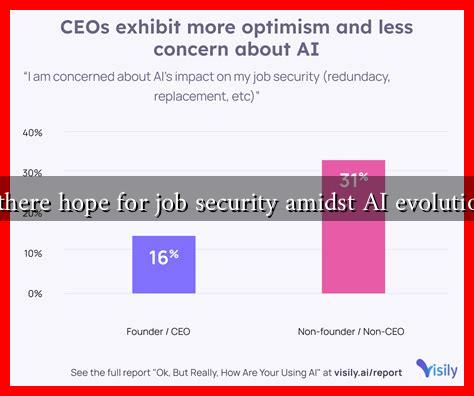-
Table of Contents
Is There Hope for Job Security Amidst AI Evolution?
The rapid advancement of artificial intelligence (AI) has sparked a significant debate about the future of work and job security. As machines become increasingly capable of performing tasks traditionally done by humans, many are left wondering: will AI lead to widespread job loss, or can it coexist with human labor, creating new opportunities? This article explores the implications of AI on job security, examining both the challenges and the potential for a harmonious future.
The Current Landscape of AI and Employment
AI technologies are transforming industries at an unprecedented pace. From automation in manufacturing to AI-driven customer service chatbots, the impact is evident across various sectors. According to a report by McKinsey, up to 800 million jobs could be displaced by automation by 2030, affecting nearly one-fifth of the global workforce. However, this statistic does not tell the whole story.
Understanding the Dual Nature of AI
AI’s evolution presents both threats and opportunities. While certain jobs may become obsolete, new roles are emerging that require human skills that machines cannot replicate. Here are some key points to consider:
- Job Displacement: Routine and repetitive tasks are most at risk. For example, roles in data entry, assembly line work, and basic customer service are increasingly being automated.
- Job Creation: New technologies often lead to the creation of new job categories. For instance, the rise of AI has led to increased demand for data scientists, AI ethicists, and machine learning engineers.
- Job Transformation: Many existing roles will evolve rather than disappear. Workers will need to adapt by acquiring new skills that complement AI technologies.
Case Studies: Industries Adapting to AI
Several industries are already demonstrating how they can adapt to the rise of AI while maintaining job security:
- Healthcare: AI is revolutionizing diagnostics and patient care. For example, IBM’s Watson can analyze medical data to assist doctors in making informed decisions. While some administrative roles may be reduced, the demand for healthcare professionals who can interpret AI findings is growing.
- Finance: In the finance sector, AI algorithms are used for fraud detection and risk assessment. While some traditional roles may decline, new opportunities in AI auditing and compliance are emerging.
- Education: AI-driven personalized learning platforms are changing the educational landscape. Teachers are now focusing on mentorship and emotional support, roles that AI cannot fulfill.
The Importance of Reskilling and Lifelong Learning
To navigate the changing job landscape, reskilling and lifelong learning are essential. Workers must be proactive in acquiring new skills that align with the demands of an AI-driven economy. Here are some strategies for individuals and organizations:
- Upskilling Programs: Companies should invest in training programs that help employees learn new technologies and methodologies.
- Online Learning Platforms: Resources like Coursera and Udacity offer courses in AI, data science, and other relevant fields, making it easier for individuals to enhance their skill sets.
- Collaboration with Educational Institutions: Partnerships between businesses and universities can create tailored programs that prepare students for the future workforce.
Conclusion: A Balanced Perspective on AI and Job Security
While the rise of AI presents undeniable challenges to job security, it also offers a wealth of opportunities for those willing to adapt. The key to thriving in this new landscape lies in embracing change, reskilling, and fostering a culture of lifelong learning. By focusing on the human skills that AI cannot replicate—such as creativity, emotional intelligence, and critical thinking—workers can find their place in an evolving job market.
In summary, there is hope for job security amidst the AI evolution, but it requires a proactive approach from both individuals and organizations. By investing in education and training, we can ensure that the workforce is prepared to meet the demands of the future, ultimately leading to a more resilient and innovative economy.
For further insights on the impact of AI on jobs, you can explore resources from the World Economic Forum [here](https://www.weforum.org/agenda/2020/10/future-of-jobs-report-2020/).

